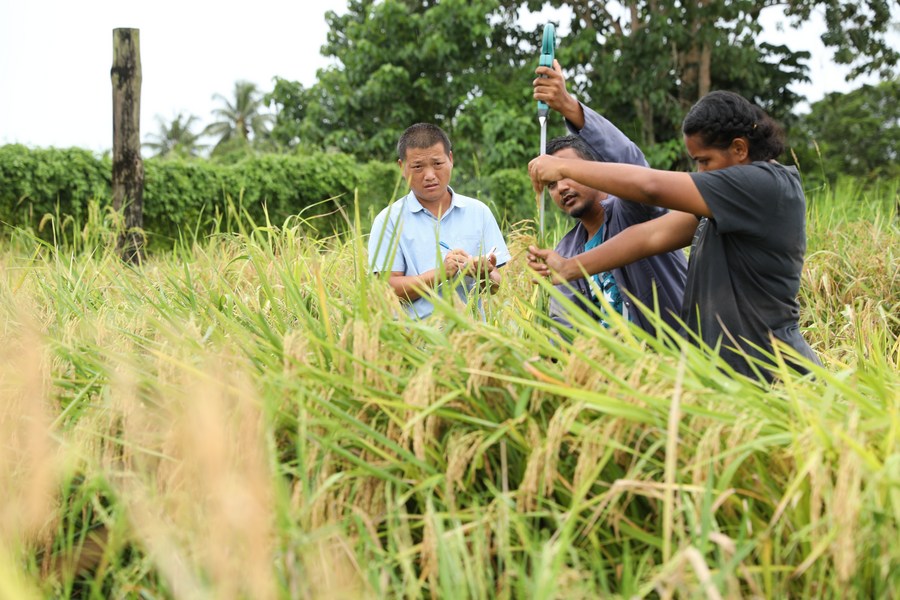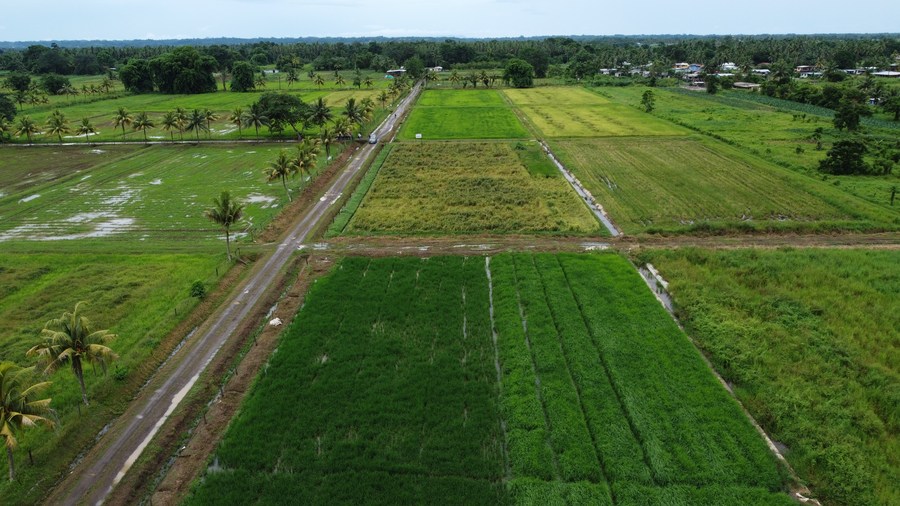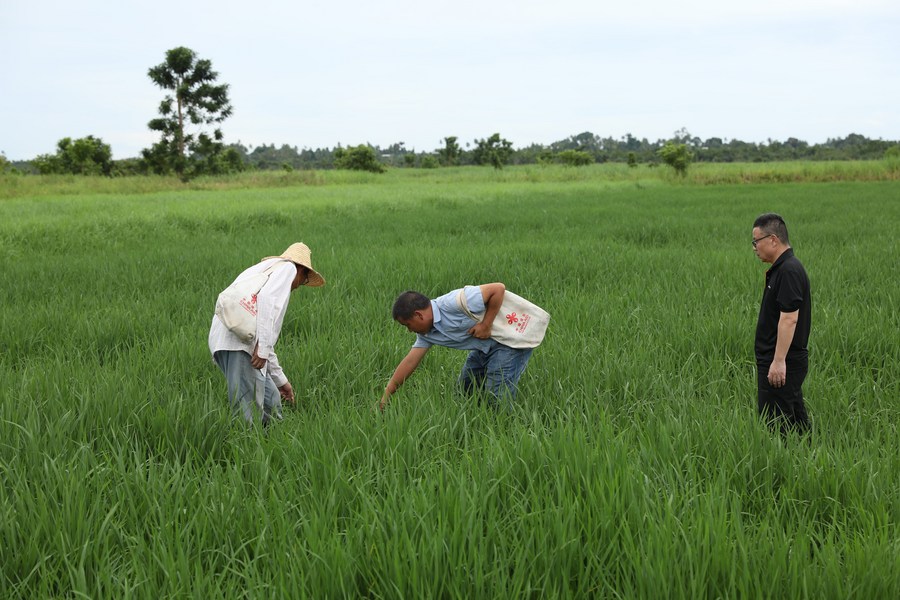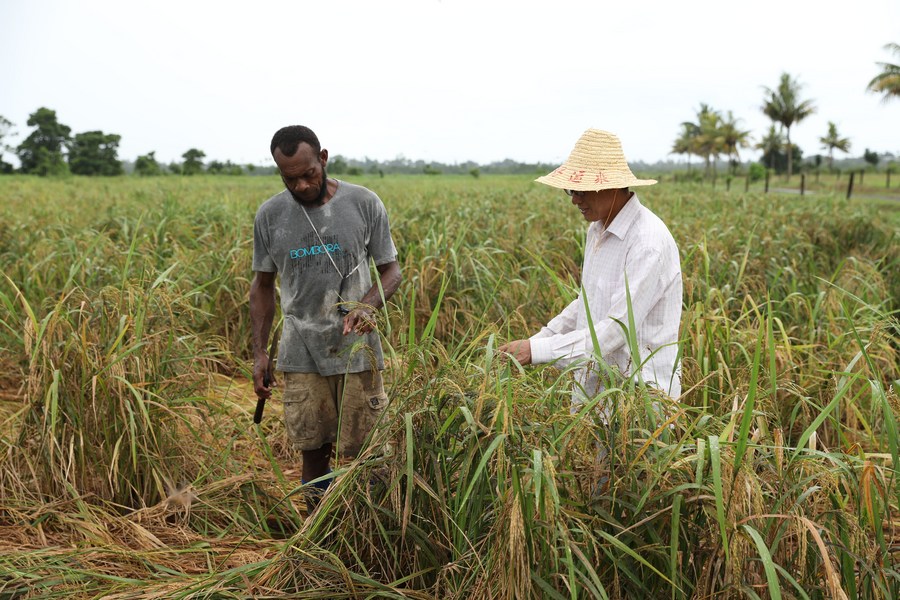


Chinese expert Wu Mingkui (1st L) measures the yield of the crop at a demonstration field of China-Aid Agricultural Development Project on rice planting in Nausori, Fiji, March 13, 2024.
"Fiji has seen an improvement in the self-sufficient level of rice since the Chinese agricultural assistance team arrived here. More cooperation between China and Fiji is something that our agricultural sector really needs forward to realize its sustainable development," said Tekini Nakidakida, deputy secretary for Agriculture Development of Fiji's Ministry of Agriculture and Waterways.
by Xinhua writers Gao Yang, Guo Xinhui
SUVA, March 18 (Xinhua) -- After days of torrential rain in the wet season of central Fiji's Nausori Town, Chen Huazao anxiously rushed to the paddy field to assess his rice crop, which was planted last November.
Wading through the muddy field, Chen's heart sank as he saw the almost mature rice plants flattened by the heavy downpours.
"We will likely face a decline in the yield of this test field. But fortunately, crops in the other two demonstration fields were not damaged," said Chen, team leader of the China-Aid Agricultural Development Project on rice planting in Fiji.
In another unaffected test plot planted with NP918, a Chinese hybrid rice variety, seed breeding expert Wu Mingkui was measuring the yield of the ripe crop.
After finishing his work, Wu told Xinhua that the yield of this Chinese rice variety was more than 7 tons per hectare, about 2-3 times of local rice varieties in Fiji.
Wu is among the six-member Chinese expert team, which arrived in Fiji in July 2023 to help the country enhance its rice production.
Rice farming is a challenging job, as the uncertainty of excessive rain, cyclones and flooding often destroys crops in Fiji and other Pacific island nations, which are highly vulnerable to climate change.
"Despite this," Chen said, "We can help local rice farmers achieve high yield by use of high-quality rice varieties and technology-driven farming techniques with scientific cultivation management measures."
STRIVING FOR RICE-SUFFICIENCY

An aerial drone photo shows rice fields in Nausori, Fiji, March 13, 2024. (Photo by Sang Qinlong/Xinhua)
Rice has been cultivated for many decades in Fiji, serving as a major source of food for its population.
However, the country's rice industry has faced challenges in recent years, marked by a decline in both lands and production, mainly due to traditional farming practices, labor shortage and the impacts of climate change.
Fiji produces less than 20 percent of its rice consumption needs, with over 80 percent being imported, said Tekini Nakidakida, deputy secretary for Agriculture Development of Fiji's Ministry of Agriculture and Waterways.
To achieve rice self-sufficiency, the Fiji government has launched the "We Rice Up" initiative, aiming to increase the production and productivity of rice crops in the country, Nakidakida said.
"That's why we need more cooperation with China," the Fiji agricultural expert said.

Chinese experts check the status of the crop at a demonstration field of China-Aid Agricultural Development Project on rice planting in Nausori, Fiji, March 13, 2024. (Photo by Sang Qinlong/Xinhua)
Through the provision of expertise, machinery, seeds, and agricultural experts, Nakidakida said China's support for Fiji's rice sector will contribute to the realization of its rice self-sufficiency goals.
Since 2015, China has carried out three phases of agricultural aid projects to help enhance rice production in Fiji. Chen's team is currently engaged in the third phase.
During the first two phases, China's agricultural team rejuvenated five local rice varieties, introduced 16 rice varieties, provided machinery for mechanized rice cultivation, and trained over 2,500 local farmers in high-yield cultivation techniques.
For the phase three agricultural aid project, China will introduce 26 rice varieties, rejuvenate 10 local rice varieties, and cultivate model farmers, Chinese expert Wu Mingkui said.
ADDRESSING CHALLENGES

Chinese expert Chen Huazao (R) checks the rice plants flattened by heavy downpours at a demonstration field of China-Aid Agricultural Development Project on rice planting in Nausori, Fiji, March 13, 2024. (Photo by Sang Qinlong/Xinhua)
To adapt the agricultural project to the specific conditions of Fiji's rice production, Chen and his colleagues conducted extensive on-site investigations throughout the island nation.
However, they encountered several challenges in their efforts to enhance local rice production. One of these obstacles is the shortage of labor.
"We face a labor shortage because many of our younger generations are migrating abroad in search of easier or more lucrative work," Nakidakida said.
He said the government will launch incentivized policies to encourage young Fijians to engage in rice cultivation, and hoped more of them will receive training in advanced agricultural technologies from Chinese experts.
Sharing technical experience in rice production is also a priority of the Chinese agricultural team.
The team has established a demonstration base at the Navuso Agricultural Technical Institute in Nausori, providing training on advanced rice cultivation techniques for the college's students.
For other challenges, they found rice cultivation areas occupy a mere 1.04 percent of the arable land in Fiji, with a low average rice yield per hectare.
"Unscientific methods prevail, with farmers broadcasting seeds by hand rather than utilizing mechanical planting techniques," Chen said.
To address these issues, the Chinese expert team has established standardized rice fields and promoted the adoption of mechanical rice planters.
"Fiji has seen an improvement in the self-sufficient level of rice since the Chinese agricultural assistance team arrived here. More cooperation between China and Fiji is something that our agricultural sector really needs forward to realize its sustainable development," Nakidakida said.
The flourishing China-Fiji agricultural cooperation epitomizes China's unremitting efforts to help achieve sustainable development in Pacific island countries (PICs) by launching multiple agricultural technical assistance projects under the Belt and Road Initiative (BRI).
Through these projects, China has helped PICs improve agricultural production capacity and food security.
China's agricultural assistance to PICs reflects its contributions to addressing global challenges and its efforts to benefit all mankind with the goal of "no one will be left behind" in global development.
点击右上角![]() 微信好友
微信好友
 朋友圈
朋友圈

请使用浏览器分享功能进行分享
